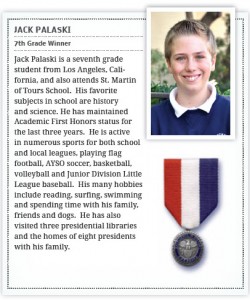Forgotten Patriots Who Supported the American Struggle For Independence
Haym Soloman: American Patriot
By
Sophia Cho
St. Martin of Tours School, Grade 5
Beverly Hills Chapter
600 words
My name is Rachel Franks, but this isn’t about me. No, it’s about my husband, Haym Soloman, and the deeds he committed while alive. Haym was born a Jew in Lissa, Poland, in 1740. He traveled around Europe working in banks so he understood foreign currency very well. Haym wanted to help the Patriots, so when he reached New York, he decided to put his skills to use. He started a successful banking business for colonists and immigrants. But one day, he made a courageous decision, though it would endanger his life. Haym decided to join the Sons of Liberty.
Haym gave up a lot to support the colonists. In 1776, Haym closed his profitable business to give supplies to the Patriot army. He went to Fort Ticonderoga, a large star fort built by Michael Chartier de Lotbinere, and brought coats, glasses, shoes, blankets, and food like meat, vegetables, and fruit. But in April, Haym heard that the Redcoats were about to attack New York. He returned, but the city was already captured. On September 20, 1776, there was a large fire. The British suspected the Sons of Liberty, so Haym was arrested and sent to the Old Sugar House jail. Later, he was moved to Provost Prison where German Hessians guarded the captives. He talked to the Hessians in German. The guards were impressed with Haym’s ability to speak different languages so they told their general, Leopold Philip von Heister, about him. Haym was hired as an interpreter for the British, but he used his opportunity to help prisoners escape. The general never suspected anything so he finally set Haym free.
Around the time he was released, he met me, Rachel Franks. We married on July 6, 1777. Then the following summer, our first son Ezekiel was born. Having a son didn’t stop Haym from working for the Patriot cause, though. He kept helping prisoners escape, sometimes hiding them in our house. Then somehow, another fire was started. It burned the fleets of British ships and once again, they suspected the Sons of Liberty. Haym was arrested and sent back to Provost Prison.
Throwing Haym into jail again was bad enough, but a conviction was the only thing the British would settle for. The charges against him were treason, sheltering spies, and secretly communicating with George Washington, among others. He was barely given any say, so he was found guilty. They put him in a cell that was guarded by a young Hessian. Luckily, Haym had taken a gold pocket watch and some coins from our house. He bribed the guard into leaving his cell open, and once he escaped, he went to Philadelphia to raise money for the Patriots. He became Robert Morris’s broker and even raised enough money so that I could come there too. He also funded the Battle of Yorktown, a fierce naval and land battle that ended the American Revolution, giving the army $20,000. When the Revolution ended, Haym still helped fund the new government. He also helped establish the Bank of North America. But in 1784, his horrible cough developed into tuberculosis. He died in 1785 at the age of forty-five.
Even though they aren’t remembered, does that mean that forgotten patriots like my husband haven’t done great things? Absolutely not. Because all their names aren’t in history books doesn’t mean that they should be forgotten. These men were the backbone of America, and without these unsung heroes, our country might’ve never come to be. So let’s all remember the forgotten freedom fighters and their importance to our Land of Liberty.
JAMES ARMISTEAD
Jack Palaski
St. Martin of Tours School
Grade 7
Beverly Hills Chapter
1000 Words
Everyone who fought and died in the American struggle for Independence was a hero. Some went down in history, such as the Founding Fathers, national heroes, and well-known patriots. Some will never be known. Others fought for independence, but not their own. My name is Marie-Joseph Paul Yves Roch Gilbert du Motier, or the Marquis De Lafayette, a noble Frenchman, who saw the struggle for independence as a righteous crusade. During the American Revolution I fought beside brave and patriotic men, but many would not get to experience their country’s hard earned freedom. I refer to the five thousand African-Americans who fought in the war for freedom. One of these African-American patriots was lucky enough to earn his freedom, because without him, our bloody struggle may have been in vain. His name is James Armistead Lafayette, one of my closest friends, and the forgotten hero who changed the war.
The struggle for freedom went beyond the battlefields, and affected even those who had no reason to fight. Thousands of brave colonists yearned for freedom. As the war began at Lexington and Concord in 1775, these farmers, merchants, and workers bravely stood up to their British oppressors. Fighting alongside the brave white colonists were equally brave black soldiers. After some early success, the colonial war machine began to slow. Thankfully, another group of unsung heroes entered the war: immigrants and volunteers from foreign nations. I joined the cause of liberty on June 13, 1777, and served in battles such as Brandywine, Albany, and Conway Cabal. I also helped convince France to join the war. At this time, one of my esteemed counterparts, Major General Benedict Arnold, defected to the British. He was a national hero with knowledge of many of the Continental Army’s closest secrets, which worried General George Washington, who ordered me to keep an eye on him with my small and inferior army. I knew that if Arnold was left unchecked, he would ravage the colony of Virginia, so I decided to place a spy in his camp. That is how I met the brave African-American volunteer named James Armistead.
As soon as a spy was needed, James volunteered himself without hesitating. James was known as a brave and loyal soldier so I accepted him as our spy. James was so convincing in the role of a runaway slave that Benedict Arnold immediately accepted him as a guide. James constantly slowed and hindered the British, and often led patrols into deep marshes where they could be ambushed. He also memorized troop orders. He began to feed the British the wrong information about American troop sizes and strengths. Eventually, Benedict Arnold decided to move to a different area. James showed his ingenuity by softly suggesting he move north, leaving Lord Charles Cornwallis unreinforced. Had Arnold realized James was influencing him, he would have been hanged as a spy. After conferring with his officers, Arnold decided to move north. The next night, no one noticed a slave slip into the forest, carrying a dispatch stating that Arnold was no longer a problem.
After Arnold left Virginia in the spring of 1781, I asked James to spy on the only large army remaining in my area; the army of Lord Charles Cornwallis, a general whose defeat could trigger the beginning of the end for the British. Like Arnold, Cornwallis immediately accepted James, but instead of making him a guide, Cornwallis added him to his personal staff. Oblivious British officers would discuss strategies right in front of James, dismissing him as a slave. Cornwallis trusted James so much that he appointed him to spy on the Americans! James had become the world’s first African-American double spy, and instantly earned the respect of all the men who knew of his role, including Washington. One day, James overheard Cornwallis discussing how to get supplies and reinforcements. The name Yorktown came up several times, and James thought nothing of it until he glanced at a map. Yorktown was on a peninsula, and we had several armies close by. Showing a vast understanding of battle tactics, James told me of his findings. I alerted Washington who then made plans for the historic siege. I realized keeping James in Cornwallis’s camp during the siege would only endanger him, so I discharged him, giving him the opportunity to return to his master’s home. Showing immense loyalty, James remained as my aide. The battered British forces surrendered on October 19, 1781 after a short but intense siege. I will never forget when Cornwallis arrived at my headquarters to officially surrender. James walked into my tent, wearing an American uniform. All Cornwallis could do was shake his head grimly, knowing that without this African-American counterspy he might have reclaimed the colonies.
The war ended soon after Yorktown, and I returned to France. William Armistead, James’s master, helped him petition for his freedom multiple times and James finally became one of the few African-Americans to be freed after the war. I was honored to learn he added Lafayette to his name. But my happiest moment was reuniting with James in 1824. I recognized and embraced James on a visit to Yorktown, and showed the world how heroes relied on brave unknown men for help. James refused to join me in France and wished to enjoy his hard earned freedom in America. James died on August 9, 1830 a free man and an unsung hero.
Not all heroes of the Revolution are remembered, but without them, our country would not be the same. Men and women like Francis Marion, Molly Pitcher, James Armistead, Baron Von Steuban, and many other patriots had an important role in our country’s start. These unsung heroes never thought about their fame or fortune, but were only concerned about duty and freedom. Even the heroes, including the many slaves and immigrants, who had no reason to fight, believed in our nation. James Armistead’s service to our country is summed up in the definition of unsung hero: “a person who makes a substantive yet unrecognized contribution, and whose bravery is unknown or unacknowledged.” We should remember all the unsung heroes and their selfless sacrifices that helped establish our country.


